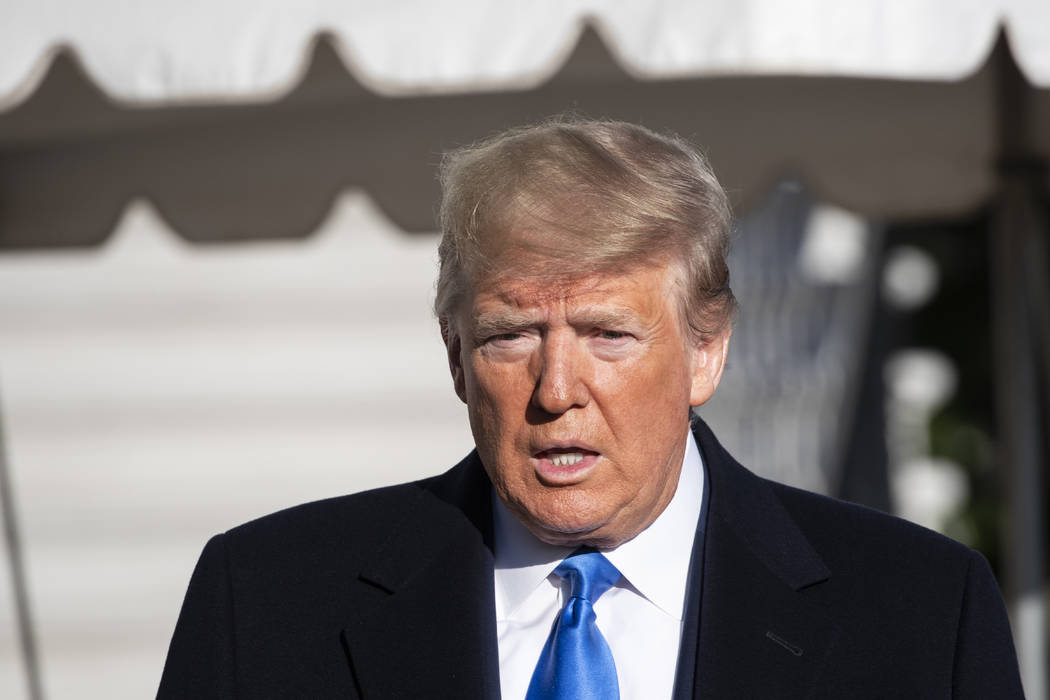Trump announces trade agreement with China
WASHINGTON — President Donald Trump announced he had reached a trade deal with China Friday morning, just as the House Judiciary Committee voted along party lines to impeach him.
The Friday announcement came as a bookend to Monday’s news that the White House had reached on a deal with House Democrats over a trade agreement with Mexico and Canada.
Thus on what could be seen as Trump’s worst week in office, the president also could claim two key victories that delivered on his campaign promise to remake the 25-year-old NAFTA agreement and had made progress on his pledge to revise trade rules with China.
Details of the China deal were not released as officials await translation and legal vetting. The administration agreed to delay new tariffs set to take effect Sunday and cut back tariffs imposed in July, while maintaining 25 percent tariffs on some $250 billion in Chinese imports, as well as 7.5 percent on $120 billion of targeted Chinese goods.
In addition to concessions on intellectual property, technology transfer, agriculture, financial services and currency issues, China agreed to buy more American goods.
“I think they’ll hit $50 billion in agriculture,” Trump told reporters as he greeted Paraguay President Mario Abdo Benitez in the Oval Office.
“The farmers are going to have to go out and buy much larger tractors, because it means a lot of business,” Trump added at the close of what he called “a wild week.”
Senate Minority Leader Chuck Schumer slammed the deal.
“At first, President Trump seemed like the only president who would dare tackle this challenge; but now, according to reports, he has sold out for a temporary and unreliable promise from China to purchase some soybeans,” Schumer said in a statement.
But U.S. Trade Representative Robert Lighthizer said the “historic” agreement “achieves meaningful, fully-enforceable structural changes and begins re balancing the U.S.-China trade relationship.”
In the briefing room, chief economic adviser Larry Kudlow said he expected Lighthizer and top Chinese negotiator Liu He will hold a “ministerial signing” when the documents are ready, probably in early January, “and then we’ll just see how it works.”
“The Trump administration is calling this ‘Phase One’ of a trade deal with China, but there is little reason to expect a phase two or three,” Robert Daly, director of the Kissinger Institute at the Wilson Center, said in a statement. “The Chinese side has already won a respite from continual American threats and appears to have done so without offering any terms it wasn’t prepared to give in 2017.”
During a phone briefing with reporters a senior administration official said that “for the first time” China had agreed to stop making corporations hand over the keys to their technology in order to do business in China.
“A strong enforcement mechanism,” he added, with a specific timetable and steps should speed up the resolution of trade disputes.
The stock market closed slightly higher at the close of business, a day after Trump tweeted that a deal to cool down the 17-month trade war was imminent.
Morgan Stanley CEO James Gorman told CNBC the phase-one deal would not drastically improve the market.
Kudlow predicted the deal, with its protections for intellectual property, would bolster business confidence and that “2020 is going to be a very, very strong economic year.”
Trump, Kudlow added, “has changed the narrative toward China” as he is determined to fight unfair trade practices that harm the U.S. workforce.
While American farmers have borne the brunt of the trade war, Daley was skeptical that “the heartland has $50 billion in goods to sell” to China. “Before the tariffs, our total annual agricultural sales to China were about $17 billion,” he said.
“Trump got rolled by the Chinese.,” responded DNC Deputy War Room Director Daniel Wessel. “Trump agreed to major concessions to China without addressing the major structural issues he promised to fix or even undoing all the damage that’s been done since he promised to take on China. This is an embarrassing defeat for the president and a stunning betrayal of the American workers, farmers, and manufacturers he’s strung along for more than two years.”
American Farm Bureau Federation President Zippy Duvall welcomed the announcement and said he looked forward to the details.
“China went from the second-largest market for U.S. agricultural products to the fifth-largest since the trade war began,” Duvall said in a statement. “Reopening the door to trade with China and others is key to helping farmers and ranchers get back on their feet. Farmers would much rather farm for the marketplace and not have to rely on government trade aid.”
Contact Debra J. Saunders at dsaunders@reviewjournal.com or 202-662-7391. Follow @DebraJSaunders on Twitter.
This year has already been tough for the hundreds of thousands of soybean farmers in America — and Donald Trump's reckless trade war has made it worse. As President, I will stand up for our farmers and protect their livelihoods.https://t.co/jlLqs0fGYo
— Amy Klobuchar (@amyklobuchar) December 13, 2019
https://platform.twitter.com/widgets.js



















